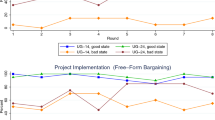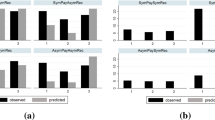Abstract
When bargaining between two actors over an object is modeled as a noncooperative game of incomplete information, equilibrium bids generally involve misrepresentation of the players' true values. But the bargainers' payoffs can be modified so that truthfully revealing one's reservation price is a dominant strategy. While such modifications define bargaining procedures that induce honesty in bidding and thereby avoid an inefficient outcome, these procedures may be vulnerable to other difficulties. The procedures analyzed are the following:Bonus Procedure: the players share a bonus equal to the overlap in their bids, whenever a settlement is feasible;Penalty Procedure: the settlement is reduced (usually probabilistically) to a level proportionate to the overlap of the bids, whenever a settlement is feasible;Appraisal Procedure: there is a settlement when, and only when, an independent appraisal is above the seller's and below the buyer's bid. The appraisal value is then the exchange price;Expansive Appraisal Procedure: there is a settlement at the appraised value, unless it is unfavorable toboth the buyer and the seller. These honesty-inducing procedures are evaluated according to several criteria, namely, efficiency in achieving feasible trades, ability to be self-financing (rather than requiring a subsidy), vulnerability to collusion, and compatibility with each player's individual interests. Besides these theoretical assessments, practical considerations, including the need for a settlement, the means of implementation, and so on, are discussed.
Similar content being viewed by others
References
BramsSteven J. (1990a).Negotiation Games: Applying Game Theory to Bargaining and Arbitration. New York: Routledge.
BramsSteven J. (1990b). “Practical Bargaining Procedures and Their Game-Theoretic Foundations,”Information and Decision Technologies 16, 263–275.
BramsSteven J., D. MarcKilgour, and SamuelMerrillIII. (1991). “Arbitration Procedures.” In H. PeytonYoung (ed.),Negotiation Analysis. Ann Arbor, MI: University of Michigan Press, pp. 47–65.
BramsSteven J., D. MarcKilgour, and ShlomoWeber. (1991). “Sequential Arbitration Procedures: Dynamic Versus Static Models of ADR.” In Stuart S.Nagel and Miriam K.Mills (eds.),Systematic Analysis in Dispute Resolution. New York: Quorum, pp. 199–220.
BramsSteven J., and SamuelMerrillIII. (1992). “Arbitration Procedures with the Possibility of Compromise,”Control and Cybernetics (Bargaining and Arbitration in Conflicts) 21, 131–149.
BramsSteven J., and SamuelMerrillIII. (1986). “Binding Versus Final-Offer Arbitration: A Combination Is Best,”Management Science 32, 1346–1355.
ChatterjeeKalyan. (1985). “Disagreement in Bargaining: Models with Incomplete Information.” In Alvin E.Roth (ed.),Game-Theoretic Models of Bargaining. Cambridge, U.K.: Cambridge University Press, pp. 9–26.
ChatterjeeKalyan, John W.Pratt, and Richard J.Zeckhauser. (1978). “Paying the Expected Externality for a Price Quote Achieves Bargaining Efficiency.”Economic Letters, 1, 311–313.
ChatterjeeKalyan, and WilliamSamuelson. (1983). “Bargaining under Incomplete Information,”Operations Research 31, 835–851.
ClarkeEdward H. (1971). “Multipart Pricing of Public Goods,”Public Choice 8, 19–33.
d'AspremontClaude, and Louis-AndréGérard-Varet. (1979). “Incentives and Incomplete Information,”Journal of Public Economics 11, 25–45.
GreenJerry R., and Jean-JacquesLaffont. (1979).Incentives in Public Decision Making. Amsterdam: North-Holland.
GrovesTheodore. (1973). “Incentives in Teams,”Econometrica 14, 617–631.
GrovesTheodore, and John O.Ledyard. (1987). “Incentive Compatibility Since 1972.” In TheodoreGroves, RoyRadner, and StanleyReiter (eds.),Information, Incentives, and Economic Mechanisms: Essays in Honour of Leonid Hurwicz, Minneapolis: University of Minnesota Press, pp. 48–111.
HagertyKathleen M., and William P.Rogerson. (1987). “Robust Trading Mechanisms,”Journal of Economic Theory 42, 94–107.
KennanJohn, and RobertWilson. (1993). “Bargaining with Private Information,”Journal of Economic Literature 31, 45–104.
LedyardJohn O. (1979). “Dominant Strategy Mechanisms and Incomplete Information.” In Jean-JacquesLaffont (ed.),Aggregation and Revelation of Preferences. Amsterdam: North-Holland, pp. 309–320.
LedyardJohn O. (1978). “Incomplete Information and Incentive Compatibility,”Journal of Economic Theory 18, 171–189.
LeiningerW., P.B.Linhart, and R.Radner. (1989). “The Sealed-Bid Mechanism for Bargaining with Incomplete Information,”Journal of Economic Theory 48, 63–106.
MoulinHervé. (1988).Axioms of Cooperative Decision Making. New York: Cambridge University Press.
MyersonRoger B. (1979). “Incentive Compatibility and the Bargaining Problem,”Econometrica 47, 61–73.
MyersonRoger B., and Mark A.Satterthwaite. (1983). “Efficient Mechanisms for Bilateral Trading,”Journal of Economic Theory 29, 265–281.
RadnerRoy. (1986). “The Internal Economy of Large Firms,”Economics Journal 96 (Supplement), 1–22.
VickreyWilliam. (1961). “Counterspeculation, Auctions, and Competitive Sealed Tenders,”Journal of Finance 16, 8–37.
Author information
Authors and Affiliations
Rights and permissions
About this article
Cite this article
Brams, S.J., Kilgour, D.M. Bargaining procedures that induce honesty. Group Decis Negot 5, 239–262 (1996). https://doi.org/10.1007/PL00020688
Issue Date:
DOI: https://doi.org/10.1007/PL00020688




